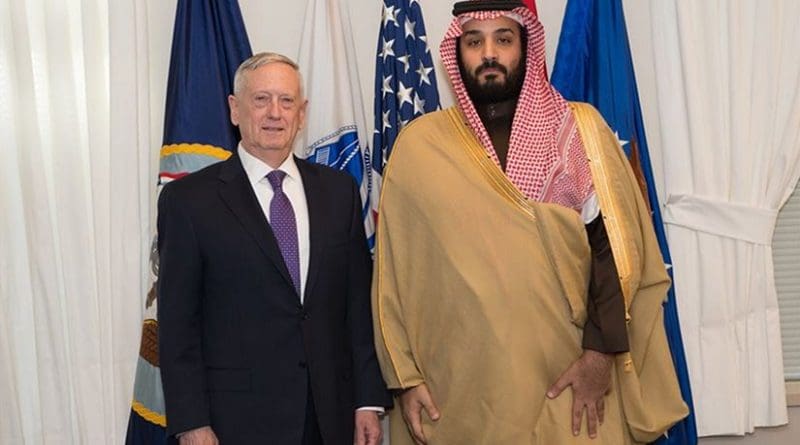Mohammed Bin Salman’s US Visit ‘Put A Face And Substance’ On New Saudi Arabia – OpEd
By Arab News
By Joyce Karam
Saudi Deputy Crown Prince Mohammed bin Salman’s five-day-visit to Washington stood out this week. Experts say the meetings were distinct in substance and style from those held previously, laying the ground for structural regional and bilateral coordination with the Trump administration and fostering closer US-Saudi ties.
The visit, which marked the first official meeting for an Arab and Muslim leader with President Donald Trump since he took office on Jan. 20, was a “stunning success,” said Afshin Molavi, a senior fellow at the Johns Hopkins University SAIS Foreign Policy Institute. “The access and reception that was given to the deputy crown prince spoke to its significance,” Molavi told Arab News.
From the Oval office tour to the state lunch at the White House’s “Family Dining Hall,” a one-on-one sit-down between Trump and Prince Mohammed, and a three-hour meeting Thursday with US Defense Secretary James Mattis, the optics were “excellent” and the meetings were “thorough,” said a Saudi adviser with the delegation.
The body language was visibly pleasant between the two parties. “Prince Mohammed speaks a language that President Trump understands: A McKinsey, business-oriented and investment language,” Molavi said.
This was received very well by the Trump team, Molavi added, and made them realize “that Mohammed bin Salman is for real, so are his reforms, his Vision 2030” for his country. A four-year investment plan worth “more than $200 billion in direct and indirect investments” was agreed on following the White House meeting.
There was a realization, said Molavi, that this is “not your father’s or grandfather’s Saudi Arabia anymore, and that there’s something different about this delegation, a sense of competence, efficiency, and not a lot of meandering.” The delegation included Energy Minister Khalid Al-Falih, Foreign Minister Adel Al-Jubeir and State Minister Mohammed Al-Asheikh, all graduated from American universities.
The adviser to the delegation told Arab News on condition of anonymity that the Saudi team “came prepared with detailed ideas and strategies on the way forward” on regional issues. After years of frustration over a lack of coordination during the second term of the Obama administration, Molavi saw in the visit a catalyst for “much-improved coordination” between Riyadh and Washington, which lays the ground for “action on rolling back Iran’s influence.”
The tone was also different, according to the expert. Gone were Obama’s phrases on “sharing the region” with Iran, substituted now with emphasis on countering a mutual threat. In its statement after the meeting, the White House said: “The president and the deputy crown prince noted the importance of confronting Iran’s destabilizing regional activities while continuing to evaluate and strictly enforce the Joint Comprehensive Plan of Action.”
Another area of coordination will be in defeating Daesh. A roadmap for Iraq post-Daesh was discussed at both the White House and Pentagon meetings. Mattis said: “The warmth of that relationship has held firm through good times and bad times over 70-odd years now, and it’s been the basis for an indispensable economic and security partnership together. The Kingdom’s leadership provides stability in the region, and the US-Saudi military-to-military relationship remains steady and consistent.”
The challenges of both Iran and Daesh were addressed by Prince Mohammed at the Pentagon. He cited the “hostile activities as the Iranian regime supports extremists and terrorists in the region and around the world, and challenges posed by terrorist organizations.”
The deputy crown prince stressed cooperation with the US, and said: “On top of the list comes the United States, the leader of the world.” He reiterated the Saudi government’s optimism in “the leadership of President Trump, and we believe these challenges will be easy to tackle under the leadership of the president.”
Molavi, a long-time watcher of Saudi and Gulf politics, said US-Saudi relations following differences with both the George W. Bush and Obama administrations over Iraq and Iran “sorely needed a shakeup, and Mohammed bin Salman shook it up with Vision 2030.”
The visit also “put a face and substance on the new Saudi Arabia that’s emerging, a very different one from the 1995 view prevalent in Washington,” and one that will “foster more sophisticated coordination and strategic cooperation” on both the bilateral and regional levels, Molavi added.

